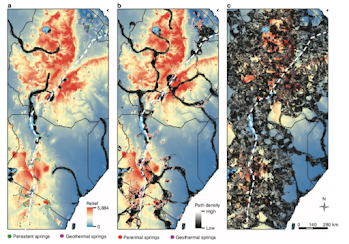A Look Back
It is increasingly argued that Africa does not have the resources to adapt to climate variability on food production systems (Challinor et al., 2007), but is this true? There is a counter-bias. Homo sapiens survived episodes of extremely arid climate phases long before any institutional intervention due to hominin migration historically. Thus, it may well be the case that the custom of African culture adequately prepares them for what is coming (Cuthbert et al., 2017). This post will look back and consider whether we have anything to learn from the nomadic tribes in Africa amidst hominin evolution before wrapping up and looking back at the topics discussed throughout this blog.
Does the hominini throughout evolution have something to teach us?
The last post discussed climate change and Africa’s lack of preparedness in terms of resources. Moreover, this may not be the case since modelling through hominin evolution in Africa presents strategies by homo sapiens to mitigate the effects of extreme climatic phases (Cuthbert et al., 2017).
Figure 1: Modelling of the dispersal of hydro-refugia during a wet-dry climate cycle
Source: Cuthbert et al., 2017
During extremely arid climate phases, there was a hominin movement from one spring network to another along major rivers – when one spring would dry up, hydro-refugia would migrate to a new spring (Cuthbert et al., 2017). Dispersal of hominin, as modelling shows, became ubiquitous. Thus, this westward dispersal of hominins allowed the population to survive and can be adopted today to cope with worsening climatic conditions with evermore springs running dry.
A previous blog on groundwater discussed the independence of the Maasai tribe. The Maasai tribe and other nomadic tribes such as the Tutsi, and independent from western institutionalisation allows them to better be prepared for climate change migrate annually in search for better grazing and agricultural lands. These pastoral nomads travel across East Africa since their livelihood depends on livestock, topography, and climate. Thus, it can be argued they are indeed equipped to cope with worsening climatic conditions just as hominin populations were.
Looking back throughout this blog
As argued throughout this blog, Africa is a continent extremely dependent. Moreover, is this where it all went wrong? Will the colonial curse discussed earlier in this blog, haunt Africa forever?
Throughout this blog, we have seen just how grave the situation is in Africa from the beginning drawing attention to the lack of accessibility and thus, mortality from unsafe water in Africa. Furthermore, we have seen just how difficult it will be to tackle the water stress hence, food scarcity in Africa with irrigation and abstraction of groundwater unable to solve widespread malnutrition. However, the potential of GMO crops to solve famine is drawn upon in a post. We should indeed, unfold our arms since GM crops have the potential to increase yields but also the nutritional content in foods. This is indispensable in countries like Somalia, the latest country in which climate change is taking its toll on. Similarly, virtual water is another alternative that could help tackle food insecurity despite increased reliance on imports reducing agricultural productivity. The construction of dams such as the Kariba Dam is an alternative to climate change that has threatened food security. Similar to climate change, the construction of the dam has forced the Tonga people onto less fertile land, decreasing yields.
Thus, there are myriad of explanations as to why the future for Africa is worrying with climate change being the most prominent worry, thought to increase rainfall intensities, temperatures and carbon dioxide concentrations. This will impact plant cover and aquifer recharge but also the viability of land for crop cultivation hence, reducing agricultural productivity and worsening food security.
Without a doubt the future of Africa is a troubling one. With climate change posing the biggest threat to food security. Moreover, there has been a reoccurring theme throughout this blog which is that of post colonialism dependency. There are approaches that could help tackle water stress in Africa and reduce food scarcity however, this does not come without a cost in the form of increasing reliance on postcolonial powers.


Hi ! I found your post and blog really interesting and detailed ! I really enjoyed reading about the nomadic tribes and their ability to adapt to climate change ! Your blog was really interesting and I really liked to read you ! It is really striking to see all the challenges that Africa must faces regarding water and the difficulties of finding a solution that fits for every countries.
ReplyDeleteHi Camille, thank you for your comment! I think looking at the traditions and ways of life of nomadic tribes is something that is neglected but indeed must be considered as they have the better ability to adapt to climate change!
Delete